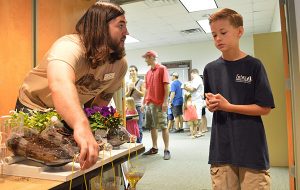Children reach out and find local wildlife

Gasps and giggles filled the Savannah River Ecology Lab Saturday during the organization’s annual Touch an Animal event.
Researchers, animal care specialists and biologists put animals on display to teach area children and their families about local wildlife and ecology.
Savannah River Ecology Director Dr. Olin E. Rhodes Jr. said “The goal of touch an animal day is to educate the public about animals and biodiversity in our region.”
Displays included animals like American alligators, common snapping turtles, possums, as well as centipedes, beetles and water dwellers, like the American eel. Pelts and furs from other animals were available to accommodate curious kids, as were snakes. Expert snake handlers kept a timber rattlesnake and an eastern diamondback rattlesnake, one at a time, partially in a tube to allow visitors to get hands-on with a venomous snake without risking a bite.
Another display featured information about feral hogs, including a touchable skull. The wild hogs are a non-native species, and the Ecology Lab, in conjunction with Savannah River Site, has worked to control the animal’s population on-site.
A horseshoe of tables in the center of the room held samples of area plant life, including poisonous and edible plants. Poisonous plant samples, such as poison oak, were kept in sealed bags, away from visitors’ skin. On the other end of the tables, though, samples of edible plants found naturally in the area were made available for public sampling. Samples included violet leaves and cactus stems. Cactus stems are commonly referred to as leaves, but according to the display, the cactus spines are the plant’s highly adapted leaves.
Rhodes said the event typically draws in about 500 people who get a chance to see what researchers and staff do at SREL every day.
“I hope the kids take away an appreciation for animals and a wonder of the natural world,” he said. “I hope parents take away an appreciation and an understanding for SREL and our role within the community.”
